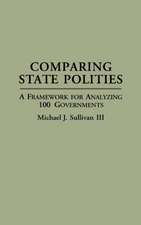Gandhi in Political Theory: Truth, Law and Experiment
Autor Anuradha Veeravallien Limba Engleză Hardback – 28 sep 2014
Preț: 764.51 lei
Preț vechi: 1027.59 lei
-26% Nou
Puncte Express: 1147
Preț estimativ în valută:
146.28€ • 152.75$ • 120.80£
146.28€ • 152.75$ • 120.80£
Carte tipărită la comandă
Livrare economică 15-29 aprilie
Preluare comenzi: 021 569.72.76
Specificații
ISBN-13: 9781472422842
ISBN-10: 1472422848
Pagini: 166
Dimensiuni: 156 x 234 mm
Greutate: 0.47 kg
Ediția:1
Editura: Taylor & Francis
Colecția Routledge
Locul publicării:Oxford, United Kingdom
ISBN-10: 1472422848
Pagini: 166
Dimensiuni: 156 x 234 mm
Greutate: 0.47 kg
Ediția:1
Editura: Taylor & Francis
Colecția Routledge
Locul publicării:Oxford, United Kingdom
Notă biografică
Anuradha Veeravalli is an Assistant Professor at the University of Delhi. Her teaching and research focus on issues regarding science, religion and politics and the relation between them through a consideration of their epistemological presuppositions in a comparative perspective.
Recenzii
’Anuradha Veeravalli provides us with a provocative study of Gandhi’s political theory. Gandhi is seen as a systematic thinker who rejects the many dualisms that dominate much modern political thought. The author not only knows her Gandhi very well but also demonstrates a keen command of Western political thinkers. In this book, Gandhi takes on not only British colonialism but also the Enlightenment and the modern nation state.’ Ronald Terchek, Professor Emeritus, University of Maryland, USA
Cuprins
Preface, Anuradha Veeravalli; Chapter 1 Introduction: Truth, Law and Experiment in Political Theory, Anuradha Veeravalli; Chapter 2 Presuppositions of War and Peace: The Mind, the World and the Law of Non-violence, Anuradha Veeravalli; Chapter 3 Sovereignty: Individual, Civil Society and the State, Anuradha Veeravalli; Chapter 4 Territory: Nationalism, Identity and Frontiers, Anuradha Veeravalli; Chapter 5 The Science of Peace: Industrialization and the Political Economy, Anuradha Veeravalli; Chapter 6 Presuppositions of Pluralism: Experiments in Unity, Equality, and Difference, Anuradha Veeravalli;
Descriere
Despite an overwhelming body of scholarship and literature on his life and thought, the true systematic nature of Gandhi’s intervention with modern political theory and his method and structure of thought have not previously received sustained attention. This book attempts to address the lacuna by contending that Gandhi’s critique of modern civilization and the presuppositions of post-Enlightenment political theory, its epistemological and metaphysical foundations was both comprehensive and systematic.















